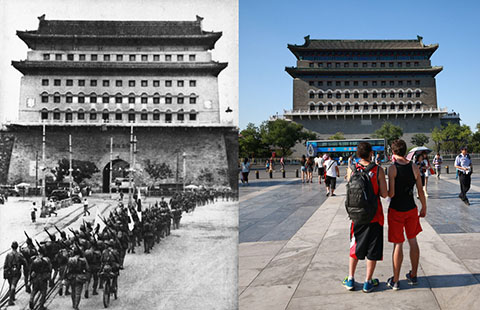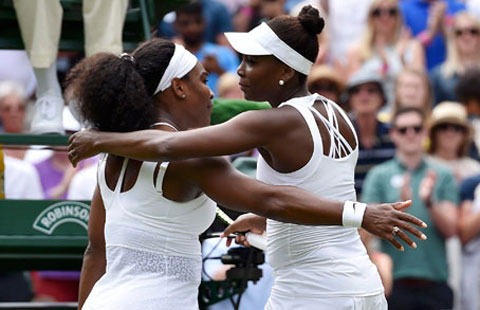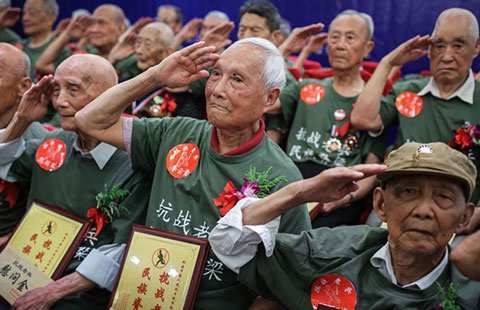China answers Clinton charges
Updated: 2015-07-07 06:03
By CHEN WEIHUA in Washington andYAN DONGJIE in Beijing(China Daily USA)
|
||||||||
China has responded to accusations by Hillary Clinton with relative calm after the Democratic presidential contender accused China of being provocative in the South China Sea and of rampant hacking into the US government and companies.
At a campaign event in New Hampshire on July 4, Clinton said China’s rise is the story of the 21s century. “How we handle that, how we respond to it will determine much of our future and the world’s future,” she said.
She said she wants to see a peaceful rise for China, and that she worked hard on that as secretary of state.
“I will continue to do so,” Clinton said. “But we also have to be fully vigilant that China’s military is growing very quickly. They’re establishing military installations that again threaten countries we have treaties with, like the Philippines, because they are building on contested property.
“They are also trying to hack into everything that doesn’t move in America – stealing commercial secrets, blueprints from defense contractors, stealing huge amounts of government information – all looking for an advantage,” Clinton said.
“Make no mistake, they know they’re in a competition, and they’re going to do everything they can to win it,” she said.
Asked to respond to Clinton’s comments, Chinese Foreign Ministry spokeswoman Hua Chunying said in Beijing on Monday that “we have noticed relevant reports. China has made clear its principled positions on cyber security and the South China Sea on many occasions.”
While Hua did not elaborate on those stances again on Monday, China and the Association of Southeast Asian Nations (ASEAN) held their 14th joint working group meeting in Kuala Lumpur, Malaysia, from July 1-3 on implementing the Declaration on the Conduct of Parties (DOC) in the South China Sea.
Hua described the meeting as “aiming to fully and effectively implement the DOC and registering positive progress on moving forward maritime pragmatic cooperation and consultations on the code of conduct in the South China Sea as well as implementing early achievements.”
China has long called on the US to stop playing up tensions in the South China Sea and finger-pointing at China while ignoring land reclamations and provocative actions by other nations, in particular US allies.
Hua said on Monday that the development of China-US relations shows nothing but the growing importance of the relationship itself.
“It is in the interests of both China and the US and conducive to peace and prosperity of the region and beyond when China and the US strengthen dialogue and cooperation in a constructive spirit in response to various challenges,” she told the daily briefing in Beijing.
China has long called the US allegations of Chinese government-sponsored cyber hacking “irresponsible”. China has said repeatedly that it is a victim of cyber hacking, much of which originated from the US.
China also has urged the US to stop its wide-ranging cyber surveillance against China, as revealed by Edward Snowden, a former National Security Agency contractor.
US Secretary of State John Kerry said on June 24 at the conclusion of the seventh China-US Strategic and Economic Dialogue that Chinese and US officials had “honest discussions” on cyber security, minus accusations and finger-pointing.
Unlike many US politicians, Kerry would not speak about the recently reported hacking of the Office of Personnel Management (OPM), saying it’s still under FBI investigation, and “we have not come out with specific statements from the government”.
“But on the broader issue of cyber security, China also has a very clear interest in making certain that everybody is behaving by a certain set of standards,” Kerry said.
The relatively calm response from the Chinese Foreign Ministry is also due to the fact that US presidential candidates have a tendency to use China as a bogeyman in their campaigns, as evidenced during the 2012 campaign by Republican candidate Mitt Romney, who said he would name China a currency manipulator on his first day in office.
Bill Clinton also employed harsh rhetoric on China during his 1993 presidential campaign but changed his stance when he became president.
Niu Jun, a professor of international relations at Peking University, believe Clinton is using her words to attract voter attention. “But candidates’ words can’t be taken seriously,” Niu said.
Fan Jishe, a professor of the America Department in the Chinese Academy of Social Sciences, said China and the US have differences on cyber hacking. “The two countries should solve the problem by dialogues. The US’ criticism on China can’t help resolve the differences,” Fan said.
Fan said that Hillary Clinton is trying to portray China as the most threatening country on hacking. “But the truth is that the US is the most powerful country in cyber hacking, and it attacks other countries hard. China is also a victim of hacking,” he said.
Speaking on Monday at the Center for Strategic and International Studies in Washington, Michelle Lee, the US undersecretary of commerce for intellectual property and director of the US Patent and Trademark Office (USPTO), said she was encouraged by China’s desire to strengthen the IP system, IP enforcement and protection.
“China is recognizing that, and they recognize they got innovators on the ground at home, and they want those ideas to be protected,” said Lee, who just returned from a trip to China where she met Chinese officials, including Vice-Premier Wang Yang.
Contact the writer at chenweihua@chinadailyusa.com
- Injured ROK tourists in intensive care
- 36 dead, 26 missing after banca capsized in C. Philippines
- Thai navy plans to buy three Chinese subs
- Mass casualties in Indonesian military plane crash
- Japan's LDP lawmaker denounces Abe's security policies
- More than 100 feared dead in Indonesian military plane crash

 Then and Now: Beijing’s historic sites as witnesses of war
Then and Now: Beijing’s historic sites as witnesses of war
 In photos: China from above
In photos: China from above
 Serena Williams beats sister Venus to reach last eight
Serena Williams beats sister Venus to reach last eight
 Culture insider: Six things you may not know about Minor Heat
Culture insider: Six things you may not know about Minor Heat
 Fancy sculptures sparkle in Chongqing
Fancy sculptures sparkle in Chongqing
 Ten photos you don't wanna miss - weekend special
Ten photos you don't wanna miss - weekend special
 US beat Japan 5-2 to win Women's World Cup
US beat Japan 5-2 to win Women's World Cup
 Veterans of World War II honored
Veterans of World War II honored
Most Viewed
Editor's Picks

|

|

|

|

|

|
Today's Top News
China answers Clinton charges
President Obama addresses IS threat
China has ability to deal with risks to economy: premier
Govt prefers peaceful means in resolving maritime row: Envoy
China predicts Greece to stay in eurozone
Chinese stocks struggle to maintain rally in afternoon
Greece enters uncharted territory after referendum 'no' vote
Chinese embassy warns travelers to be careful in Turkey
US Weekly

|

|







